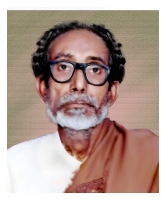Abdul Hye Mashreki
Abdul Hye Mashreki | |
|---|---|
আবদুল হাই মাশরেকী | |
 | |
| Born | 1 April 1919 |
| Died | 4 December 1988 (aged 69) Mymensingh, Bangladesh[1] |
| Nationality | Bangladeshi |
| Alma mater | Ananda Mohan College |
| Occupation(s) | Poet, lyricist, playwright, narrator |
| Notable work | Used local wordings in Bengali poems for the first time |
| Awards | Greater Mymensingh Literature Award, Provati Ekushe Award |
Abdul Hye Mashreki (1 April 1919 – 4 December 1988)[2] was a Bangladeshi folk litterateur and poet.[1][3] He is known for his writing in the 1930s and 1940s.[4] He mainly focused the lifestyle of the rural people of Bengal. Some notable works of him include Rakhal Bondhu, Jarina Sundari, Allah Megh De Chaya De, Fande Poriya Boga Kande Re, Amar Kakher Kolshi, He Amar Desh and Kichu Rekhe Jete Chai.[1][5]
Mashreki wrote against the social, economical, religious and racial discrimination in the rural area. Mihir Acarya, researcher of Bengali literature named three main folk poets – Mashreki, Jasimuddin and Bande Ali Mia – in his research in the time period of 1917 to 1936.[6]
Birth and education
[edit]Mashreki was born in the village of Kakonhati of Ishwarganj Upazila in Mymensingh District on 1 April 1919 in his maternal uncle's house[7][8] His father Osman Gani was an active worker of the movement against Jamindar and his mother was Rahima Khatun. Earlier of his education, he studied intermediate education at Ananda Mohan College of Mymensingh.[citation needed] Later, he moved on to Kolkata.[6]
Works
[edit]- Poetry
- Kichu Rekhe Jete Chai
- He Amar Desh
- Mather Kobita Mather Gaan
- Vatiyali
- Ovishopter Bani
- Desh Desh Nondita
- Kal Nirobodhi
- Hazrat Abu Bakr (R.A)
- Swadesher Proti Hazrat Muhammad (Sm)
- Hutum Vutum Ratri[8]
- Story
- Drama
- Notun Gayer Kahini
- Sanko
- Rakhal Bondhu
- Jarina Sundari
- Jari Gaan
- Dukhu Miar Jari
- Others
- Dal Dhoriya Nuyaiya Konnya
- Akash Keno Nil
References
[edit]- ^ a b c "Tributes: The Forgotten Folk Bard Abdul Hye Mashreki – Business News 24 BD". businessnews24bd.com. Archived from the original on 28 October 2018. Retrieved 28 October 2018.
- ^ "Remembering Abdul Hai Mashreki". The Daily Star. 2 April 2019. Retrieved 2 April 2019.
- ^ কবি আবদুল হাই মাশরেকী. The Daily Sangbad (in Bengali). Archived from the original on 1 September 2017. Retrieved 28 October 2018.
- ^ a b আবদুল হাই মাশরেকী'র গল্প নিয়ে বাংলা ছবি 'কুলসুম (in Bengali). Archived from the original on 17 October 2015. Retrieved 28 October 2018.
- ^ আবদুল হাই মাশরেকী স্মরণে দুদিনব্যাপী অনুষ্ঠান. Prothom Alo (in Bengali).
- ^ a b "The Forgotten Folk Bard". Daily Sun.
- ^ a b কবি-আবদুল-হাই-মাশরেকী. iswarganj.mymensingh.gov.bd (in Bengali).
- ^ a b লোককবি আবদুল হাই মাশরেকীর ৯৭তম জন্মদিন কাল (in Bengali). banglatribune.com.
